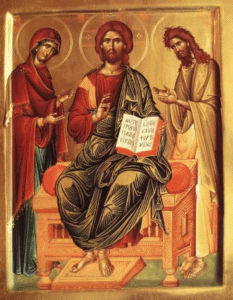 Of all the events in the life of Our Lord, His transfiguration on Mount Tabor IS the event which, I believe, truly conveys the real meaning and purpose of human life. The WAY of Jesus reveals to us how we can become more like Him, Who is God incarnate. Since we have been made in the image of God, earthly life has been given to us as an opportunity to grow in His likeness. When Jesus was transfigured, He revealed the God-life that is within all humans. He was joined by Moses and Elijah. Moses is the Old Testament prophet who was inspired to write that we humans were made in God’s image and in His likeness. Elijah further revealed this truth by his own deathless ascension (in his fiery chariot) into the afterlife. The three disciples, Peter, James and John, were given this vision so that they might truly understand the WAY of Jesus and be able to lead the Church in her preaching of this message.
Of all the events in the life of Our Lord, His transfiguration on Mount Tabor IS the event which, I believe, truly conveys the real meaning and purpose of human life. The WAY of Jesus reveals to us how we can become more like Him, Who is God incarnate. Since we have been made in the image of God, earthly life has been given to us as an opportunity to grow in His likeness. When Jesus was transfigured, He revealed the God-life that is within all humans. He was joined by Moses and Elijah. Moses is the Old Testament prophet who was inspired to write that we humans were made in God’s image and in His likeness. Elijah further revealed this truth by his own deathless ascension (in his fiery chariot) into the afterlife. The three disciples, Peter, James and John, were given this vision so that they might truly understand the WAY of Jesus and be able to lead the Church in her preaching of this message.
I am sure that I have probably shared this with those who know me, it is our tradition to bless fruit on the feast because at the center of fruit is usually some sort of seed(s) or pit which, of course, represents the seed of life within us that is God’s own life-force.
All different ethnic groups within Eastern Christianity seem to bless different fruits. It is not so important what type of fruit we bless. What is important that we bless fruit and realize the symbolism behind the blessing. In Rus-Ukraine, grapes of the vine were replaced by apples and other fruits.
Some of the Fathers of the Church call the feast of the Transfiguration the second Theophany. Its observance goes back to the fourth century. It was originally celebrated in February but, because it fell during the time of the Great Fast, its celebration was changed to the 6th of August. The historian Eusebius and St. John Damascene were of the opinion that the Transfiguration took place forty days before the death of Christ. The feast now takes place 40 days before the feast of the Exaltation of the Holy Cross (September 14th).
Further, the feast now takes place during what is usually harvest time for various fruits. It probably also replaced a pagan feast of the harvest. The custom of blessing the first-fruits in church was prescribed in the Canons of the Holy Apostles at the end of the third century and in the fourth century the Apostolic Constitutions actually contain a prayer for the blessing of fruits.
